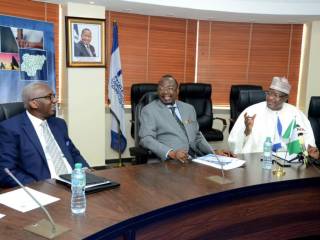It is pertinent to note that the Commission has established Digital Bridge Institutions in some selected states of the country realizing the role of ICT in development, growth and youth empowerment.
The Digital Bridge Institutes which have been most important channels for NCC to facilitate ICT training and development have trained over 50,000 participants under the ADAPTI and other professional ICT courses and Programmes since its inception.
Despite the remarkable impact of the DBI on human development in ICT, it is believed that the institutes are still being underutilized for the purposes for which they are established and to ensure their sustainability more is expected and has to be done.
Engineer Ernest Ndukwe, former EVC- NCC and Chairman of the Expert Committee notes that DBI can become the hub and the catalyst for ICT Innovation research programmes in the country enabling skills acquisition, tech startups and the much needed job creation for the digital economy of today.
Ndukwe also observed that there are shortages of ICT talents/ skills to meet job opportunities at the present time as reflected in the following reports-
A recent manpower group study shows that in the Americas, 39 percent of employers report hiring challenges caused by IT talent shortages. Acute shortages were reported by employers in Brazil, India, Turkey, Hong Kong, and Japan. And across the globe, skilled engineers, technicians and IT staff are among the top seven hard to fill jobs and enjoy great outsourcing. He further noted that Nigeria is no exception which calls for this initiative and other similar interventions by NCC to bridge the digital divide gap and encourage innovation.
The World Economic Forum 2017 Global Information Technology Report stated clearly that “ ICTs are vectors of economic and social transformation by improving access to services, enhancing connectivity, creating business and employment opportunities.”
The United Nations heads of States and Government in the United Nations’ Declaration at the beginning of the new Millenium resolved, among other things, “ to develop and implement strategies that give young people everywhere a real chance to find decent and productive work.” The Secretary General of the UN, in his report to the Millenium Assembly, highlighted the need to explore imaginative approaches to this difficult challenge.” This must be what NCC seeks to achieve for the nation by this initiative, stated Ndukwe.
Chairman Board of NCC, Senator Olabiyi Durojaiye stated that the Commission is committed under this drive to train the youths of Nigeria so as to be major actors in the Fourth Industrial Revolution by discovering, innovating and inventing solutions that will address current and future needs of mankind and as a result earn more foreign exchange and respect in the comity of nations.
Senator Durojaiye reiterated the areas the Committee were asked to focus on:
Development of ICT curriculum for training and research programmes in each proposed centre.
Identify and profile the current state of DBI physical infrastructure and existing gaps.
Identify technical requirements for each centre ( labs, workshops, studios etc) and all other possible alliances, collaborations and programmes for each proposed centre.
Identify utility requirements for the centres ( power, water etc).
Any other matter the Panel considers necessary to achieve this mandate.
The Committee submitted a 45 page document made up of two broad sections: The Executive Summary and the Main Report. The Committee made 18 recommendations which are captured in the Executive Summary and in section VII of the Main Report. The Committee made an important recommendation of the role to be played by NCC- funding, where they recommended that a small portion of the Annual Operating Levy (AOL) be permanently appropriated for the Operations with proper accountability.
The Committee is made up of the following members:
Engineer (Dr.) Ernest Ndukwe Chairman
Engineer Titi Omo-Ettu Member
Professor Mohammad Ajiya Member
Alhaji Abdullahi Maikano. Member
Dr. Ike Adinde Member
Engineer Johnson Asinugwo Member
Mr. Shehu Olabiyan. Secretary.
Dr. Chris Uwaje member
Dr. Terseer Nyulaku member
Mr. Bosah Chukwuogo member
